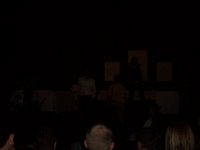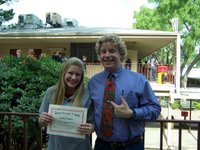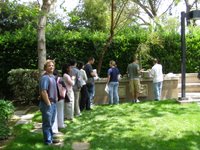It began on Tuesday night, at Jacob's orchestra concert. The elementary orchestra played--more or less in the keys of D and G Major--and a few students did solos. Granted, standards were not especially high. But when our boy sounded the first notes of his solo, it was fun to watch the other parents' jaws drop. Jacob played even better than he does at home, which might suggest the virtues of playing conditions that do not involve dishes clanking and little brothers running around.
 Then, on Thursday, I attended the Fuller Seminary awards convocation. No big surprises here. I knew I had received a Brehm Fellowship since, well, that's how we've been paying my tuition all year. Still it was a nice occasion and I enjoyed getting some props from the be-robed Fuller faculty. That's me up there with President Mouw and my fellow Brehmmie, Eric Jacobsen. Really. It is. Stupid flash.
Then, on Thursday, I attended the Fuller Seminary awards convocation. No big surprises here. I knew I had received a Brehm Fellowship since, well, that's how we've been paying my tuition all year. Still it was a nice occasion and I enjoyed getting some props from the be-robed Fuller faculty. That's me up there with President Mouw and my fellow Brehmmie, Eric Jacobsen. Really. It is. Stupid flash. Next up: Mia. Friday morning at 8 a.m. was middle-school awards "chapel." It was less a chapel than an occasion on which middle schoolers could enjoy screaming and cheering for their classmates with impunity. Mia had no idea that she was getting an award, but fortunately, the school had notified her mom and dad, so we were there. To keep the secret from Mia, we had to come up with blatant lies about "having a meeting" that morning in order to explain why we were dressed and ready so early. Each teacher gave an award to one student in each subject in each grade level. Mia, all our geeky math-and-science friends will be happy to learn, got the seventh grade science award, and a shiny bit of atom-shaped bling-bling that I proudly wore as a tie-tack the rest of the day.
Next up: Mia. Friday morning at 8 a.m. was middle-school awards "chapel." It was less a chapel than an occasion on which middle schoolers could enjoy screaming and cheering for their classmates with impunity. Mia had no idea that she was getting an award, but fortunately, the school had notified her mom and dad, so we were there. To keep the secret from Mia, we had to come up with blatant lies about "having a meeting" that morning in order to explain why we were dressed and ready so early. Each teacher gave an award to one student in each subject in each grade level. Mia, all our geeky math-and-science friends will be happy to learn, got the seventh grade science award, and a shiny bit of atom-shaped bling-bling that I proudly wore as a tie-tack the rest of the day. And last but not least, the rumors have now been confirmed. Deb's book So Much More was chosen by Christianity Today magazine to receive an Award of Merit for 2006 in the apologetics/evangelism category. Whoo hoo! It's great for Deb as a young whipper-snapper writer to be among a hoary assembly of authors the likes of N.T. Wright, Rowan Williams, Robert Wuthnow, Eugene Peterson, and other old white guys.
And last but not least, the rumors have now been confirmed. Deb's book So Much More was chosen by Christianity Today magazine to receive an Award of Merit for 2006 in the apologetics/evangelism category. Whoo hoo! It's great for Deb as a young whipper-snapper writer to be among a hoary assembly of authors the likes of N.T. Wright, Rowan Williams, Robert Wuthnow, Eugene Peterson, and other old white guys. That's it this week. But Pip's award assembly is coming up soon. Last year he got best "Christian Attitude." Let's hope he's got the spiritual resources to deal with a) his insufferably self-pleased parents and siblings and b) a house whose current state of upheaval guarantees that the Rienstra family will win no housekeeping accolades anytime soon.
That's it this week. But Pip's award assembly is coming up soon. Last year he got best "Christian Attitude." Let's hope he's got the spiritual resources to deal with a) his insufferably self-pleased parents and siblings and b) a house whose current state of upheaval guarantees that the Rienstra family will win no housekeeping accolades anytime soon.















